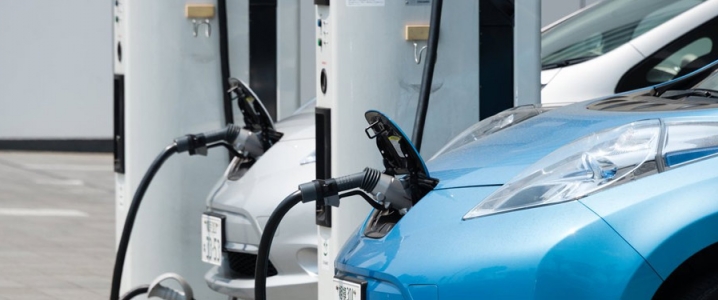Automakers are looking for states to support electric vehicle sales and charging infrastructure development — regardless of what President Donald Trump and EPA Administrator Scott Pruitt end up deciding to do about federal rules on fuel economy and emissions.
A trade group representing U.S. and foreign automakers has sent letters to governors of nine states that follow California’s zero emission vehicle program. The Alliance of Automobile Manufacturers would like to see these states — Connecticut, Maine, Maryland, Massachusetts, New Jersey, New York, Oregon, Rhode Island and Vermont — take steps to increase EV sales that would include investing in the infrastructure and offering attractive incentives such as tax credits for purchasing the vehicles.
They’d also like to see fleets play a significant role, with automakers asking states and local governments to purchase more ZEVs for their fleets.
Major automakers had approached the Trump administration last year asking that the Obama administration’s late decision to formalize the second phase of fuel economy and emissions targets be put on hold. They’d expressed concerns that the 46.8 miles per gallon target was not going to be accomplished by 2025 and would need more time for adoption.
EPA chief Pruitt indicated that the targets would be gutted and that California’s ZEV targets wouldn’t not be taken seriously. That led to 17 states, including California, suing the EPA to reinstate the targets and protect California’s ZEV mandate.
Automakers were upset that the Trump administration’s stance would quite costly through litigation and new legislation passed by large states representing sizable auto sales.
Global carmakers see ZEVs — especially electric vehicles — to be inevitable over the next decade. The U.S. may be softening the mandates adopted under the Obama administration, but mandates are increasing for EV sales in China and much of Europe. Related: IEA: Oil Prices Could Rise Further As Shale Can’t Fill The Gap
General Motors, BMW, Daimler, Nissan, and other companies, want to see the huge investments they’ve made in EVs and hydrogen fuel cell vehicles pay off. They do expect governments to play their part in bridging the wide gap between skeptical car shoppers and early adopters of the new technology.
Several states are making commitments to backing the technology. New York will be investing $4.2 million to deploy high-speed EV charging stations along a state highway. Several states are setting up structures for public utilities to make their own investments in EV charging networks. Seven states have agreed to work with automakers on an education campaign to inform the public about the availability of EV models, benefits gained, and available purchasing incentives.
The U.S. Department of Energy reports that there are 58 ZEV models available in the U.S. — 21 battery electric, 34 plug-in hybrids, and three fuel-cell vehicles. Sales continue to be small, with hybrids and ZEVs accounting for only 3.2 percent of new sales last year in the U.S.
Automakers are also growing weary with Trump’s aggressive stance on proposed tariffs for importing vehicles. LMC Automotive predicts that if Trump’s proposed 25 percent tariff on imported were to be put in place, it may cost the U.S. auto industry 1 million annual vehicle sales. That number would double to 2 mission sales of the entire tariff spike were to be passed on to consumers.
Companies such as Ford, GM, Tesla, Daimler, BMW, and Nissan, are setting goals for selling EVs in the booming China market — and in other key markets in Europe and North America. Tensions between countries such as China and U.S. may disrupt their joint ventures and vehicle distribution strategies.
Tariffs imposed by the Trump administration to aluminum and steel are already pushing up their costs for GM, according to CEO Mary Barra.
The White House had imposed a 25 percent tariff on imported aluminum and steel. The Trump administration is also exploring the idea of imposing a 25 percent tariff on vehicles that are exported to the U.S. from the European Union as well as Mexico, Canada, and China.
Barra is concerned that cost increases will impact affordability of the vehicles and consumer appeal. GM would need to be price competitive to maintain its role in global new vehicle sales. Related: China’s Surprising Move To Cut Solar Subsidies
Automakers are working on reducing lithium-ion battery costs, extending EV range after being charged, and working with utilities and governments on building out the charging infrastructure. Government incentives play a large role across the world in making all of this a reality.
With the Trump administration pulling support away from fuel economy and emissions targets, automakers are looking for other markets to fill some of that void. That will include foreign markets and working closely with state and local governments to make incentives available for EV purchases and charging. The U.S., especially California, had been the dominant EV market for several years. That’s been transitioning over to China, with Europe playing as important role as the U.S.
By Jon LeSage for Oilprice.com
More Top Reads From Oilprice.com:
- IEA: Oil Prices Could Rise Further As Shale Can’t Fill The Gap
- Oil Prices Rebound On Crude, Gasoline Inventory Draws
- Venezuela Won’t Have Enough Oil To Export By 2019


















